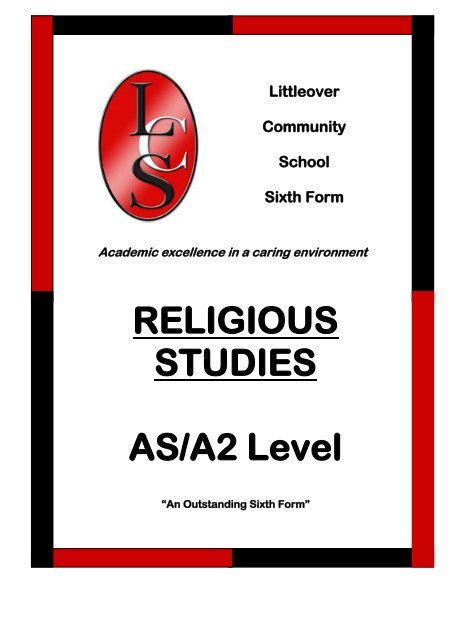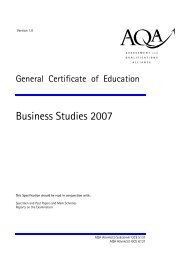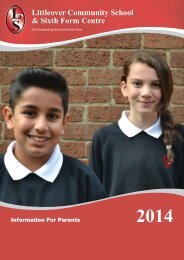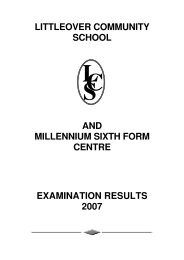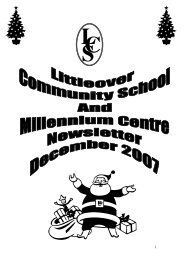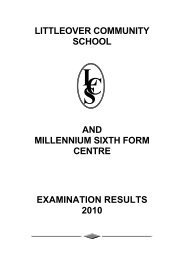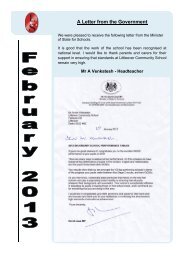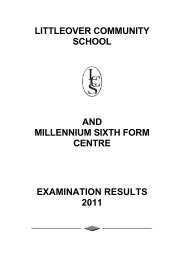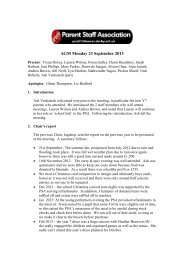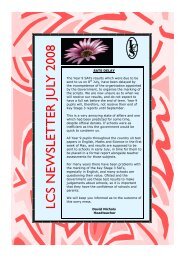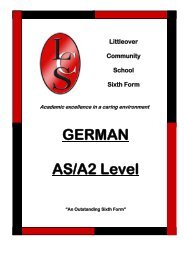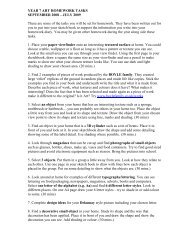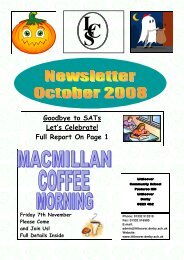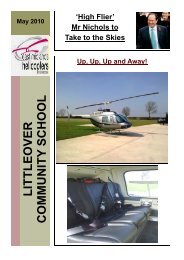Philosophy & Ethics (Religious Studies) - Littleover Community School
Philosophy & Ethics (Religious Studies) - Littleover Community School
Philosophy & Ethics (Religious Studies) - Littleover Community School
You also want an ePaper? Increase the reach of your titles
YUMPU automatically turns print PDFs into web optimized ePapers that Google loves.
<strong>Littleover</strong><br />
<strong>Community</strong><br />
<strong>School</strong><br />
Sixth Form<br />
Academic excellence in a caring environment<br />
RELIGIOUS<br />
STUDIES<br />
AS/A2 Level<br />
“An Outstanding Sixth Form”
Examination Board:<br />
AQA<br />
Syllabus Content:<br />
AS<br />
Unit 1A: <strong>Ethics</strong> 1<br />
1. Utilitarianism<br />
General principles of utilitarianism<br />
The application of utilitarianism to an ethical issue of the candidate’s choice<br />
2. Situation <strong>Ethics</strong><br />
Situation ethics and the idea of situation and ideas about conscience<br />
The application of situation ethics to an ethical issue of the candidate’s choice<br />
3. <strong>Religious</strong> teachings on the nature and value of human life<br />
4. Abortion and Euthanasia<br />
Arguments for and against abortion with reference to religious and ethical teachings<br />
Unit 1D: Religion, <strong>Philosophy</strong> and Science<br />
1. Miracles<br />
Violations of natural law and events of religious significance<br />
Arguments from philosophy and science<br />
2. Creation<br />
<strong>Religious</strong> beliefs about the creation of the universe and the origin of human beings<br />
An outline of key scientific theories on the nature and origin of the universe and<br />
human beings<br />
The challenge to religious belief presented by science, and religious responses<br />
3. The Design Argument<br />
The Design Argument as presented by Aquinas and Paley<br />
Responses to the Design Argument from philosophy and science<br />
4. Quantum Mechanics and a religious world view<br />
Key ideas in the world view of Quantum Mechanics<br />
The implications to religion and philosophy of Quantum Mechanics<br />
A2<br />
<br />
<br />
Unit 3B: <strong>Philosophy</strong> of Religion<br />
1. The Ontological Argument and the relationship between faith and reason<br />
The argument as presented by Anselm and Descartes<br />
Key objections to the argument<br />
The relationship between faith and reason<br />
2. <strong>Religious</strong> language<br />
Problems of religious language, meaningfulness and the verification principle<br />
Different views of religious language<br />
3. Body, soul and personal identity<br />
The nature and existence of soul and body<br />
Personal identity<br />
Nature and value of near death experiences as evidence of survival beyond death<br />
4. The problem of evil<br />
The concept of evil<br />
<strong>Religious</strong> responses to the problem of evil<br />
The strengths and weaknesses of these responses<br />
Unit 4C: Ways of moral decision making<br />
Candidates will be expected to understand and apply the approaches religions and ethicists take<br />
to moral decision making. They can select from the following topics:<br />
Medical research and medical developments<br />
Business practice and economics<br />
Both areas will be studied from the perspective of a range of ethical theories and religious<br />
teachings.
Qualities required:<br />
<br />
<br />
<br />
<br />
<br />
A keen interest in dealing with challenging issues through research, thought,<br />
discussion, analysis, and argument.<br />
A desire to challenge personal thinking and attitudes.<br />
A willingness to exchange views and arguments with others.<br />
A willingness to explore new and wider perspectives in thinking.<br />
A determination to challenge one’s own intellect.<br />
Method of Assessment:<br />
AS Units – 50% of A Level mark<br />
Unit Method of Assessment Exam<br />
Month<br />
% of A<br />
Level<br />
Marks<br />
% of AS<br />
Level<br />
Marks<br />
1A Written examination (1 hour 15 minutes) June 25% 50%<br />
1D Written examination (1 hour 15 minutes) June 25% 50%<br />
A2 Units –<br />
Unit Method of Assessment Exam<br />
Month<br />
% of A<br />
Level<br />
Marks<br />
3B Written examination (1 hour 30 minutes) December 25%<br />
4C Written examination (1 hour 30 minutes) June 25%
Future Prospects:<br />
<br />
<br />
<br />
<br />
<br />
This subject is highly regarded by all universities.<br />
It is a key area of study for medicine, law, politics, journalism, the health<br />
service, science related work, business, and all people-centred work.<br />
The subject provides a grounding in key skills and learning that help generate<br />
free and critical thinking and self-confidence whilst being relevant to a wide<br />
range of career opportunities.<br />
Essential issues that appear regularly in the media and which are applicable<br />
to us all are studied – hence life itself is our focus.<br />
An excellent grounding for future study and employment is offered through<br />
challenging concepts, perceptions and arguments.


